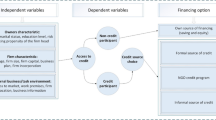Abstract
This paper employs the Sustainable Livelihood Framework and social capital theory to examine the economic activities and livelihood strategies of Liberian refugees in the Buduburam Camp in Ghana. The paper is based on primary data collected through questionnaire surveys, in-depth interviews, and focus group discussions. The findings show that the Liberian refugees, in the Buduburam Camp, are pursuing their livelihoods within a macroeconomic environment that is characterized by various forms of vulnerabilities, which include resource constraints and lack of employment opportunities. Even though most of the refugees lack the necessary physical and economic assets to live within such a vulnerability context, they have relied on networks of social capital to survive for several years. Based on these findings, it has been recommended that Liberian refugees, in Ghana, should be encouraged to form mutual groups to enhance the benefits from such social networks. Churches and community-based organizations that are providing material assistance to vulnerable refugees must also be encouraged to continue with their humanitarian work in the camp.

Similar content being viewed by others
References
Adepoju, A. (1982). The dimension of the refugee problem in Africa. African Affairs, 81(322), 21–35.
Al-Sharmani, M. (2004). Refugee livelihoods: livelihood and diasporic identity constructions of Somali refugees in Cairo. New Issues in Refugee Research, Working Paper no. 104. Geneva: UNHCR.
Blavo, E. Q. (1999). The problems of refugees in Africa: boundaries and borders. Aldershot, England: Ashgate.
Boateng, A. (2012). Survival voices: social capital and the well-being of Liberian refugee women in Ghana. Journal of Immigrant & Refugee Studies, 8(4), 386–408.
Bryman, A. (2001). Social research methods. London, England: Oxford University Press.
Carney, D. (Ed.). (1998). Sustainable rural livelihoods: what contribution can we make? London: DFID.
Chambers, R., & Conway, G. (1992). Sustainable rural livelihoods: practical concepts for the 21st century. IDS Discussion Paper 296. Brighton: Institute of Development Studies.
Chambers, R. (1995). 347, Brighton. UK: Institute of Development Studies. Poverty and livelihoods: whose reality counts? IDS Discussion Paper, No.
Chambers, R. (1997). Responsible well-being—a personal agenda for development. World Development, 25, 1743–1745.
Clark, K., & Drinkwater, S. (2007). Ethnic minorities in the labor market: dynamics and diversity. York: Joseph Rowntree Foundation.
Conway, C. (2004). Refugee livelihoods. UNHCR, EPAU: A case study of the Gambia. Geneva.
Department for International Development (DFID) (1999). Sustainable livelihoods guidance sheets. http://www.eldis.org/vfile/upload/1/document/0901/section2.pdf. Accessed 21 January 2012.
Desai, V., & Potter, R. B. (2006). Doing development research. London: Sage Publications Ltd, England.
Dick S. (2002). Liberians in Ghana: living without humanitarian assistance. New Issues in Refugee Research, Working Paper No. 57, Geneva: UNHCR
Glick Schiller, N., Basch, L., & Blanc-Szanton, C. (1995). From immigrant to transmigrant: theorizing transnational migration. Anthropological Quarterly, 68(1), 48–63.
Hardgrove, A. (2009). Liberian refugee families in Ghana: the implications of family demands and capabilities for return to Liberia. Journal of Refugee Studies, 22(4), 483–502.
Horst, C. (2006). Transnational nomads: how Somalis cope with refugee life in the Dadaab camps of Kenya. Oxford and New York: Berghahn Books.
Jacobsen, K. (2002). Livelihoods in conflict: the pursuit of livelihoods by refugees and the impact on the human security of host communities. International Migration, 40(5), 95–123.
Jacobsen, K. (2005). The economic life of refugees. Bloomfield, CT: Kumarian Press.
Kibreab, G. (1985). African refugees: reflections on the African refugee problem. Trenton, NJ: Africa World Press.
Kibreab, G. (1995). Eritrean women refugees in Khartoum, Sudan, 1970–1990. Journal of Refugee Studies, 8(1), 1–25.
Kibreab, G. (2003). Displacement communities and reconstruction of livelihoods in Eritrea. Oxford, England: Oxford University Press.
Martin, P., & Widgren, J. (2002). International migration: facing the challenge. Population Bulletin, 54, 1–40.
Maimbo, S. M. (2003). Migrant labor remittances in Africa: reducing obstacles to developmental contributions. http://www.livelihoods.org/hot topics/docs/RemitAfrica.pdf. Accessed on 21 November 2011.
Ogata, S. (2005). The turbulent decade: confronting the refugee crisis of the 1990’s. New York: Norton & Company.
Omata, N. (2013). Repatriation and integration of Liberian refugees from Ghana: the importance of personal networks in the country of origin. Journal of Refugee Studies, 26(2), 265–282.
Ostrom, E. (2005). Understanding institutional diversity. Princeton, NJ: Princeton University Press.
Porter, G., Hampshire, K., Kyei, P., Adjaloo, M., Rapoo, G., & Kilpatrick, K. (2008). Linkages between livelihood opportunities and refugee-host relations: learning from the experiences of Liberian camp-based refugees in Ghana. Journal of Refugee Studies, 21(2), 230–252.
Scoones, I. (1998). IDS Working Paper (72). Brighton: Institute of Development Studies. Sustainable rural livelihoods: a framework for analysis.
Teye, J. K. (2012a). Forest resource governance in Africa: proposition for a policy network model. Journal of Forest Policy and Economics. doi:10.1016/j.forpol.2012.08.012.
Teye, J. K. (2012b). Benefits, challenges and dynamism of positionalities associated with mixed methods research in developing countries: Evidence from Ghana. International Journal of Mixed Methods Research, 6(4), 379–391.
UNHCR. (2006). Refugee livelihoods: a review of the evidence. Geneva: Switzerland.
UNHCR (2007) UNHCR Global Appeal 2008–2009: Ghana. http://www.unhcr.org/publ/PUBL/ 474ac8d20.pdf. Accessed 15 February 2011.
Veney, C. R. (2007). Forced migration in Eastern Africa: democratization, structural adjustment, and refugees. New York, NY: Palgrave Macmillan.
Woolcock, M. (2001). The place of social capital in understanding social and economic outcomes. Retrieved 2/2/05 from http://www.isuma.net/v02n01/index_e.shtml. Accessed on 22 November 2011
Woolcock, M., & Narayan, D. (2000). Social capital: implications for development theory, research, and policy. The World Bank Research Observer, 15(2), 225–249.
Author information
Authors and Affiliations
Corresponding author
Rights and permissions
About this article
Cite this article
Teye, J.K., Yebleh, M.Kd. Living Without Economic Assets: Livelihoods of Liberian Refugees in the Buduburam Camp, Ghana. Int. Migration & Integration 16, 557–574 (2015). https://doi.org/10.1007/s12134-014-0352-6
Published:
Issue Date:
DOI: https://doi.org/10.1007/s12134-014-0352-6




